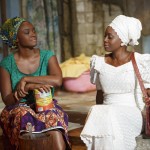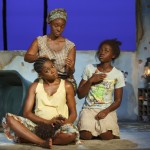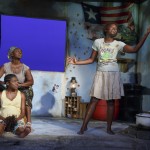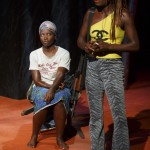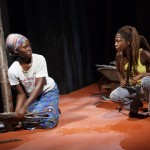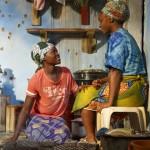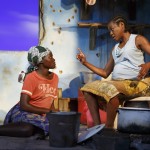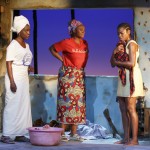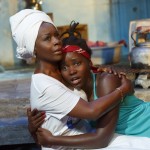Even during the curtain call of Eclipsed, a time when audience members and actors usually take a collective breath and return to reality, the story’s force lingered. The theater remained steeped in the atmosphere of Liberia during the civil war in 2003, and the question left hanging in the air was, What is going to happen to these five women?
The play descended on New York City with fervor when it opened last fall at the Public Theater. In almost record time, it was picked up to go to Broadway, where it is set to open on February 23, with an all-star cast that includes Lupita Nyong’o, Zainab Jah and Saycon Sengbloh. Critics, theater-goers and movers-and-shakers in both the arts and activist scenes were raving.
“The superlative performances from all five actors, under [Liesl] Tommy’s sensitive direction, draw us so deeply into the lives of the women that this darkness nevertheless flickers with glimmers of light, humanity and even hope,” wrote Charles Isherwood in the New York Times.
Eclipsed tells the intimate and brutal story of women sequestered in a rebel camp, at the whim of one “C.O.” and called on to cook, clean and copulate with an unseen, but terrifying, rebel leader. Denied their humanity, the women refer to each other by the numbers they were assigned: Wife #1, #2, #3 and #4. With a small cast and a minimal set, the actors took the audience into the final days of a civil war wrought by the notorious dictator Charles Taylor and the equally merciless rebels who eventually overthrew him.
A short but powerful experience, the story behind the play is almost as powerful as the one on stage. The team of women who created the piece are a cast of superheroes in and of themselves. Part of the source of that power seems to draw from all the iterations Eclipsed has been through, and the fact several of the women who touched this play have been part of it more than once.
“It may be the fabric of sisterhood and intimate trauma that must be present in order for the story to be told,” said Danai Gurira, the writer, about the way the same group keep coming back together to put on ever stronger versions of the play. “It nurtures intimate bonds amongst the company, perhaps because they must connect deeply and trust each other deeply in order to go where they must with the story.”
The play has also been staged in Washington D.C. and at the Yale Repertory Theater in 2009; twice in South Africa — in 2010 and 2014; once in Zimbabwe in 2012 and in London in 2015.
Gurira is a force. In addition to playing one of the leads, Michonne, in AMC’s horror drama Walking Dead (which she was shooting during the production), the celebrated playwright will open another play soon, Familiar just as Eclipsed heads to Broadway. She wrote Eclipsed in 2008 and just keeps returning to it, as do the rest of the cast.
Nyong’o — the Oscar-winner (12 Years a Slave), style icon and Star Wars star — grabbed headlines in the Public Theater production for her role as Wife #4. She played the youngest of four women who were caught and confined to a compound. In 2009, the global superstar was an understudy for the production but she stayed connected to it and reportedly declined three films in order to perform in Eclipsed’s New York premiere.
“I grew up in a country and in a world that consumed a lot of Western popular culture, and so I was starved for stories about people like me,” Nyong’o told The New York Times, when the play first opened off-Broadway last fall. “This seemed like a prime opportunity to do a story about Africans that also really allowed me to stretch myself, to experience totally different circumstances from the ones I grew up in.”
And now the women who have touched this play are not only bringing a story about the continent to Broadway, which is a rarity in and of itself, but are also bringing the story of women, written and directed by women, to an industry that is notoriously skewed when it comes to gender. Just over 20 percent of this season’s plays on Broadway are written by women.
Zainab Jah was a member of Eclipsed’s 2009 production and its 2015 run at The Public — and is now preparing to take it to Broadway. Her character stands out from the others. She is the one who decides to leave the compound, pick up a machine gun and fight the war alongside the men, rather than remain behind and submit to the generals. Her aggressive, intimidating presence provides a contrast that is both terrifying and inspiring on the stage.
“I never get a catharsis!” she said after a Saturday matinee. “Everyone else gets some sort of catharsis, but my character never seems to get out of it.”
Jah, who is from Sierra Leone by way of London and also a long-time New Yorker, was prepared. She had come off a successful spring run of Hamlet, playing the lead, at Philadelphia’s Wilma Theater, before Eclipsed opened at the Public in the fall. “Hamlet influenced this iteration as far as the confidence it gave me,” she said. “I had nothing to prove.”
From that very masculine, bellicose place, playing the Danish prince, she came into this production, run by women through and through. “I never had female friends. And I never had black female friends, and not only black female friends but African female friends. I found a sisterhood,” said Jah.
She rattles off the names of other women who touched the play at various points, including Ayesha Jordan, who played the role of Wife#4 in the Washington production and is slated to be Nyong’o’s understudy on Broadway, and Adepero Oduye, who played Wife #4 in the Yale Repertory Theatre in 2009. “Crazy Eyes” from Orange is the New Black, Uzo Aduba also played Wife #1 in 2009.
The director, Liesl Tommy, has sprinkled her fairy dust on the show more than once. She is an Obie-award winning director who worked on piercing plays like Appropriate and The Good Negro as well as directing more mainstream productions like Les Miserables.
The same goes for actress Saycon Sengbloh, who has been a mainstay in some of Broadway’s biggest productions, including Fela! and Holler if you Hear Me.
In other words, none of these women, from Nyong’o to Jah are strangers to buzz. Still, the caliber of artists and activists who greeted them backstage at The Public was on another level. When Leymah Gbowee, the Liberian Nobel Peace Laureate stopped by, the room fell silent. Stevie Wonder graced the room early on and Angelique Kidjo filled the space with her presence when she saw the play. Zainab Bangura, the Special Representative of the Secretary-General on Sexual Violence in Conflict made a point to see the play.
Akosua Busia, who played Nettie in The Color Purple, straddles the film and theater worlds and returned to the stage for Eclipsed after a long hiatus. She did what many women would like to do, but can’t always afford to do — she took a long break from a thriving career to raise her daughter. Eclipsed was her return to the scene.
Busia plays the role of an older woman who visits the compound as a part of a peacekeeping mission. She is the voice of reason and progress. To her falls one of the lines most repeated throughout the play, and the one intended to help restore the women’s humanity. “Who is your mother? What is her name?”

